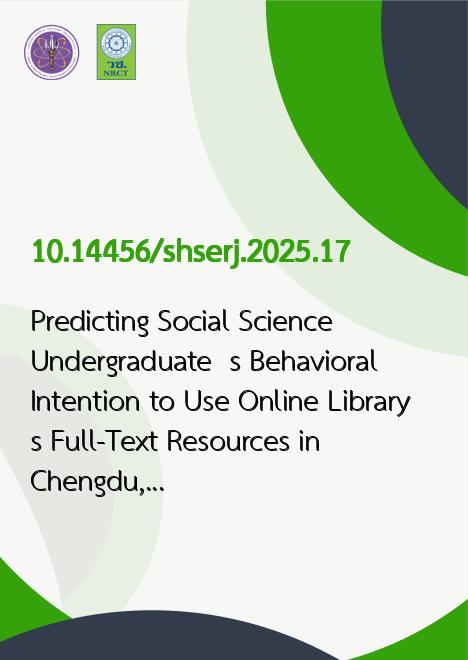
|
Predicting Social Science Undergraduate s Behavioral Intention to Use Online Library s Full-Text Resources in Chengdu, China |
|---|---|
| รหัสดีโอไอ | |
| Creator | Wenyuan Zhang |
| Title | Predicting Social Science Undergraduate s Behavioral Intention to Use Online Library s Full-Text Resources in Chengdu, China |
| Publisher | Assumption University Press |
| Publication Year | 2568 |
| Journal Title | The Scholar: Human Sciences |
| Journal Vol. | 17 |
| Journal No. | 1 |
| Page no. | 179-189 |
| Keyword | Digital Library, Perceived Usefulness, Subjective Norms, Attitude, Behavioral Intention to Use |
| URL Website | http://www.assumptionjournal.au.edu/index.php/Scholar/article/view/7912 |
| Website title | The Scholar: Human Sciences |
| ISSN | 2586-9388 |
| Abstract | Purpose: This study analyzed the factors affecting the behavioral intention to use of full-text digital library resources by social sciences students to provide a new perspective for constructing digital libraries in Chinese colleges and universities. The key variables are system quality, information quality, perceived ease of use, perceived usefulness, subjective norms, attitude, and behavioral intention to use a digital library. Research design, data, and methodology: The study selected 500 undergraduate students with social science disciplinary backgrounds from 10 universities in Chengdu as research subjects. the Index of Item-Objective Congruence (IOC) and Cronbach s Alpha coefficient were conducted to ensure the validity and reliability before the data collection. Confirmatory factor analysis and structural equation modeling were used to verify the validity of the hypotheses. Results: System quality and information quality significantly influence perceived ease of use and perceived usefulness. Perceived ease of use has a significant influence on perceived usefulness. Perceived usefulness, perceived ease of use and subjective norms significantly influence attitude. Additionally, attitude to use and subjective norms significantly influence behavioral intention to use. Conclusions: The results of this study have positive significance for university libraries, service providers, and users in using digital resources more efficiently, improving college students' information literacy, and even building a learning society. |
